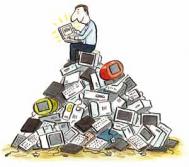THESE DAYS, most of us have access to a computer. However, almost as soon as we've bought one, it becomes obsolete as newer, faster, more capable models go on sale. It's tempting to be sucked into the upgrade cycle, but the damage to our environment both in the disposal of computers and in their manufacture is costly.
Waste from computers takes up a large proportion of the electronic waste generated in the UK. Even before a computer reaches you, the manufacturing process has already generated a significant amount of waste, the majority of which is classified as hazardous. In the US, such toxic waste is shipped out to Asia, causing severe pollution and health problems for local communities; this also occurs illegally from Europe. The EU Directive on waste electrical and electronic equipment (WEEE) is designed to place the emphasis for recycling on the companies rather than the consumer.
The market for refurbished computers has increased markedly, yet less than 20% of all computers discarded in the UK are recycled. Hewlett Packard offers a take-back service, but only for companies.
There are serious health concerns to consider for those working in the computer manufacturing industry. A recent study, for example, found elevated rates of cancer and premature death among workers at a semi-conductor factory in Scotland. Many manufacturers also use cheap labour in countries that have little or no legislation in place to protect workers. A report by the charity CAFOD released last year found workers in countries such as Taiwan who were paid less than legal minimum wages and forced to work overtime. Unlike the clothing industry, which is responding to pressure by campaigners to change overseas working practices, we have seen little progress by electronic companies with regard to workers' rights and 'codes of conduct'. Unfortunately for consumers, fairtrade labels do not exist for computers yet.
The good news, however, is that there is a range of computer eco-labelling schemes. Look for the US Energy Star, which is awarded to products consuming less energy, the German Blue Angel scheme, or the Swedish TCO label. TCO has banned some heavy metals and other toxic ingredients from products receiving its certification and it also requires manufacturers to implement environmental management systems, produce an environmental report and mark components for recycling.
When choosing a screen, opt for a flat screen rather than a cathode ray tube monitor, as less energy is used in its production and use. Flat screen monitors also contain fewer non-renewable materials and ozone-depleting chemicals, and create less hazardous solid and radioactive waste. They last on average three years longer.
If you need to upgrade or buy a computer, consider what you will use it for - the chances are that if you only use it for internet surfing or word processing, a second-hand or refurbished computer may well meet your needs and lessen the burden on the environment.
If only new will do, then choose your brand carefully. Ethical Consumer's 'Ethiscore' website www.ethiscore.org listed these companies as having better ethical records in May 2005: Evesham PC, MESH computers and Viglen PCs. Time and Tiny PCs scored the next highest. Brands to avoid include Toshiba and Sony Corp. However, Sony has recently announced that it is working hard to remove certain toxic chemicals (including PVC and brominated flame retardants, which are both thought to be harmful to our health). Apple continues to be the target of the US-based Computer TakeBack Campaign. It has performed poorly in the campaign group's annual report cards, which evaluate computer companies based on their design of toxin-free products and on the recycling of obsolete products.
Samsung has been acclaimed by Greenpeace for its commitment to phasing out hazardous chemicals. Dell was particularly commended by Ethical Consumer for its environmental credentials, as it operates computer take-back schemes and also has received a number of environmental positive labels. Alongside Hewlett-Packard, it was also one of the few computer companies to have an acceptable code of conduct for its workers.
Minimising the amount of computer waste you generate by recycling components or whole computers will lessen the burden on the environment. However, the best environmental contribution you can make is to consider carefully whether or not you really need to buy new equipment.
For further information:
Waste Online: Tel: 0870 243 0136. www.wasteonline.org.uk








